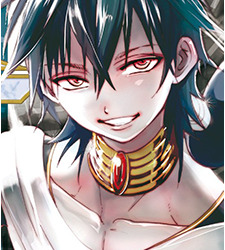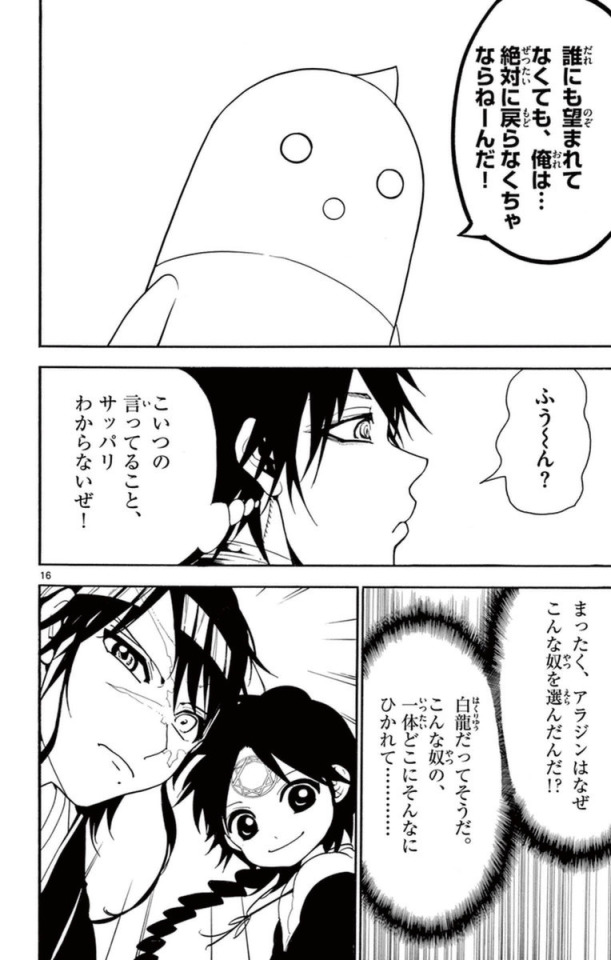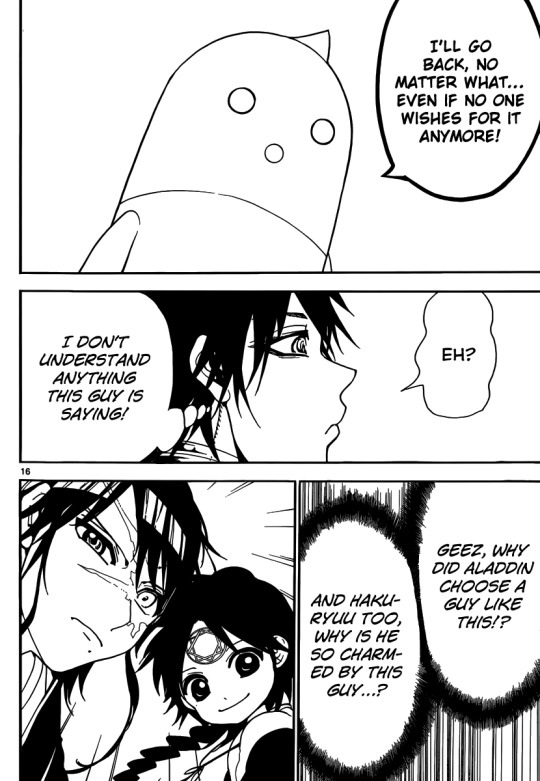#Idk what's with this post that makes Tumblr lag like a mf whenever I go to edit it
Explore tagged Tumblr posts
Text
Magi: Judar + JuAli Rambles 🖤❤️💛🐈⬛☀️

Hi! I’ll be writing my reaction rambles after reading a few Magi volumes in JP.
Thanks to Bas, the leader of the fan-scanlation group Project Vinland, and a mutual of mine who’s big in the scanlation community, I got access to Magi’s JP Raws.
Viz’s official English translation of Magi is fine for the most part, in terms of translation quality.
I’ll be putting Sense Scans’ EN fan-TL and Viz’s EN official TL here for reference.
Since I don’t see the need to re-translate lines that both the fan-TL and official TL already translated correctly.
I love the prose that Sense Scans uses in their Magi fan-scanlation.
For certain lines, though, I’ll also be putting the literal translation (from my head).
My beloved JuAli 🖤❤️💛🐈⬛☀️
Wanted to ramble about them!

Judar’s pronouns
俺 (Ore, “I”) - Casual, informal, rude. Mainly used by men.
お前/おまえ (Omae, “You”) - Casual, informal, rude. Mainly used by men.
Notes:
Judar’s first-person pronoun is 俺 (Ore, “I”). Judar’s second-person pronouns is おまえ (Omae, “You”)
Judar uses the very casual and informal, rude, masculine pronouns 俺 (Ore, “I”) and おまえ (Omae, “You”). He uses the kanji version of 俺 (Ore, “I") as his first-person pronoun, and interchangeably uses the kanji and hiragana versions of お前/おまえ (Omae, “You”) as his second-person pronoun.
He speaks pretty casually and informally. He uses colloquial particles (shortens verb conjugation endings) sometimes.
Extra Notes:
In “Role Language” (役割語, Yakuwarigo), fictional characters’ dialects — the usage of pronouns, particles, etc., conveys character traits such as gender, age, class, and levels of formality, etc.
俺/おれ/オレ (Ore) is an informal first-person pronoun, and very rough version of “I” almost exclusively used by males in casual (informal) situations.
俺 (Ore) tends to be used by characters who are very rough, casual, vulgar, sleazy, in a position of power, and/or, just very manly/masculine.
お前/おまえ/オマエ (Omae) is a very rough second-person pronoun for “You” usually used by males in casual (informal) situations. Usually only used between close friends IRL. It has an aggressive and rude edge when not used between friends. Also used to speak down to others from a higher position.
Arrogant characters (including arrogant royals), tend to lean into using more rough, casual masc pronouns such as 俺 (Ore) and お前 (Omae), such as Xanxus (KHR), Kuroha/Saeru (KagePro), Judar (Magi), Edward (ROTRK), Vegeta (DBZ), Enzan (MMBN/EXE), etc., since they’re in positions of authority and/or high status, and look down on others.
Many of my favourite characters, such as Judar (Magi), Xanxus (KHR), Kuroha (KagePro), Enzan (MMBN/EXE), Edward (ROTRK), and many more, have very rough and masculine speech patterns in JP. All of the characters I listed here also use 俺 (Ore) and お前 (Omae) as their main pronouns.
It’s very typical of rude and arrogant masc characters to lean into using them. Characters who are casual/informal and masculine in general, also tend to lean into using them.
Whether a character uses the kanji or hiragana or katakana versions (or combination) as their pronouns could be used to give off a certain nuance. But it depends on the character and context.
(I actually copied these notes from my XanLena dialogue scripts cuz I don’t feel like writing all of that again. I’ll post more of my KHR AU stuff reventually!)
How he refers to others:
Alibaba:
アリババくん (Alibaba-kun, “Alibaba”)
アリババ (Alibaba, “Alibaba”)
ハニワ (Haniwa, “Clay doll”)
Sinbad:
シンドバッド (Shindobaddo, “Sinbad”)
バカ殿 (Baka tono, “Idiot king”)
Note: 殿 (tono, “feudal lord”)
Hakuryuu:
白龍 (Hakuryuu, “Hakuryuu”)
Aladdin:
アラジン (Arajin, “Aladdin”)
Judar's Usage of Particles:
の (no) - Sentence ending particle. Can be used to soften a sentence.
な/なあ (na/naa) - Sentence ending particle. Masculine, usually used by men.
ね/ねえ (ne/nee) - Sentence ending particle. Can be used to soften a sentence. [X]
よ (yo) - Sentence ending particle. Often used to soften a sentence.
ぜ (ze) - Sentence ending particle. Rude, rough, informal, masculine, used to add emphasis. Slightly softer than the sentence ending particle ぞ (zo). Usually used by men.
んだ (nda) - Sentence ending particle, used to add emphasis. Casual/informal version.
んだよ (nda yo) - See above, but it adds the nuance of trying to give a new perspective to the listener that they don’t have. [X]
だ (da) - Sentence ending particle. Masculine, forceful, used for emphasis.
だろ (daro) - Sentence ending particle. Masculine, forceful, used for emphasis.
じゃん (Jyan) - Casual colloquial of じゃない (Jyanai) → Has the nuance of “Isn’t it?” and “Actually.” Makes the sentence softer.
Ex. いるんだ (irunda)
んだ (nda) has a casual nuance. He uses colloquial particles.
Not a comprehensive list, but ones I’ve noticed so far. I’ll probably edit the section about his usage of particles later since I still need to check them
Judar often shortens verb conjugations in his casual/informal speech style.
Characters like Judar, Xanxus, (and Enzan occasionally) use shortened verb conjugations, colloquials (casual forms) of verbs. This is very typically masc. Rougher masc charas often do this
Ex.
いらない (Iranai, "Don't need/want [it]") (Plain negative form) → Iran or Iranee (いらん/いらねえ, “Don’t need/want [it]”) (Shortened casual/informal negative form)
いらない (Iranai) → いらん/いらねえ (Iran/Iranee)
Magi: Vol. 27 - Ch. 266
JP (Original)


Page 1
Judar: Huh?
ジュダル:ふう~ん?
(Judaru: Fuu~n?)
...
Judar: (I don't understand what this guy is saying at all!)
ジュダル:(こいつのいってること、サッパリわからないぜ!)
(Judaru: Koitsu no itteru koto, sappari wakaranai ze!)
...
Judar: (Geez, why did Aladdin choose this guy!?)
ジュダル:(まったく、アラジンはなぜこんな奴を選んだんだ!?)
(Judaru: Mattaku, Arajin wa naze konna yatsu wo eranda nda!?)
...
Judar: (And Hakuryuu too. Just what about this guy that charmed him so much…………)
ジュダル:(白龍だってそうだ。こんな奴の、一体どこにそんなにひかれて…………)
(Judaru: Hakuryuu datte sou da. Konna yatsu no, ittai doko ni sonna ni hikarete…………)
Note: Comes from the verb 惹かれる (hikareru, “to be charmed by; to be attracted to; to be taken with; to be drawn to”)
Page 2
Judar: That's right, just what about Alibaba charmed Aladdin and Hakuryuu enough to make them so fixated with him?
ジュダル:そうだ、アラジンと白龍は、アリババの一体何にそんなにひかれて、あんなにこだわっていたんだ?)
Note: Te-ita form verb conjugation. Comes from the verb 拘る (kodawaru, “to be obsessive (about); to be overly concerned (with); to be hung up (on); to be fixated with”)
(Judaru: Souda, Arajin to Hakuryuu wa, Aribaba no ittai nani ni sonna ni hikarete, anna ni kodawatteita nda?)
...
Judar: (I just don't understand.)
ジュダル:(俺にはわからないぜ。)
(Judaru: Ore ni wa wakaranai ze.)
Fan-TL (Sense Scans)


Official TL (Viz)


I get both JuAli and AliHaku crumbs from Judar’s monologue about Alibaba. Isn’t that amazing? ^v^
I already talked about this scene plenty before, so I won't copy paste the same rambles from before.
Fan-TL is spot on with this ^^
Viz removes the first mention of "Charmed/Attracted" in the 1st page, but at least keeps it in the 2nd page.
I think the gist is kept, but the original and fan-TL are more explicit and obvious about it.
"That's right, what about Alibaba charmed them so much to make them so fixated with him?"
...
I noticed that in the last sentence, Judar's 何 (nani, "what") has a dot in place of furigana (characters that denote the pronunciation of a word, or add a certain nuance to the text).


This is called 圏点 (kenten, "emphasis mark") or 傍点 (bouten, "emphasis mark").
This is used for emphasis, similar to how English uses underlines or italics or bold for emphasis.
It has an emphatic nuance. It's used to add emphasis on a word. Typical manga fonts used in official localizations have all words in capital letters, so Ig in this case, bold or italics could convey this kind of nuance.
...
Judar: That's right, just WHAT about Alibaba charmed Aladdin and Hakuryuu enough to make them so fixated with him?
The equivalent in English would be something like this:
(Capital letters)
Judar: That's right, just what about Alibaba charmed Aladdin and Hakuryuu enough to make them so fixated with him?
Or this
(Bold)
Judar: That's right, just what about Alibaba charmed Aladdin and Hakuryuu enough to make them so fixated with him?
Or this
(Italics)
...
Or this
(Underline)
Judar: That's right, just what about Alibaba charmed Aladdin and Hakuryuu enough to make them so fixated with him?
Oooooh you're stumped by it!!!
Alibaba's charm points of what drew others to him...
You wanna know so bad, huh?
I think I got more to say in general about this scene, but I wrote enough for now ^^
You already get the point 👍
Other Notes
Me: Some of Viz’s spellings are just weird to me, like them translating Magnostadt as a direct romanization → Magnoshutatt
Magnostadt (マグノシュタット, Magunoshutatto)
For some reason???
...
Friend: God bless you Sen 😭💓💓 This is all really fascinating to read
Me: You're welcome! English is so BORING to me as a language when it comes to things like this, because everyone sounds the same. You're either normal or you're cowboy. Yeehaw /lh
Vietnam has a lot of dialects and speech quirks! The main ones are the North, South, and Central Vietnamese dialects. And they have many variants depending on the area
I love how languages like Vietnamese and Japanese can express things like character traits and personality, etc., in speech.
I love how it can convey the "vibes" that a character gives off right away, just from their speech style/patterns.
Yakuwarigo ("Role Language"), fictional characters' dialects/speech styles in Japanese, is SOOO interesting, and English doesn't have a proper equivalent for it.
This is part of why I wanted to learn Japanese. THIS conveys things like character traits and different speech styles SO MUCH more.
Also keep in mind that I’m doing these quick literal TLs quickly based on my interpretation of the text, and that I’m still learning JP, so I can make mistakes 🙏
If you notice any, feel free to correct me!
Resources
If you’d like to learn more about Japanese pronouns in an IRL context, see these links:
Yakuwarigo

Links
Japanese particles
Do note that Role Language in fiction can differ partially and/or a lot from usage in IRL contexts.
In fictional characters’ dialects, 貴方/あなた (Anata, “You”) is considered a neutral or polite/formal pronoun (depending on the context)
IRL, it’s rude to call someone with 貴方/あなた (Anata, “You”) because “it sounds accusatory to pound the listener with ‘You’ every sentence”
Emphasis Marks
#magi#magi: the labyrinth of magic#judar#judal#juali#aliju#judar magi#alibaba saluja#alibaba magi#judal magi#judali#judaali#judar x alibaba#judal x alibaba#alibaba x judar#alibaba x judal#sen's rambles#I think this post is already long enough but I'd love to expand on it more sometime#I could talk about them all day ^v^#It's just that typing and formatting these kinds of ramble posts takes time y'know#Probably gonna update this in the future with examples of his usage of particles#Idk what's with this post that makes Tumblr lag like a mf whenever I go to edit it#Thank god it saves the edits tho#I swear I've written even longer posts than this before
26 notes
·
View notes